EdTech
Custom LMS Development vs. Ready-Made Solutions: Which One is Right for You?
February 07, 2025 • 129 Views • 25 min read
Tetiana Stoyko
CTO & Co-Founder
Like any other field, software development for learning management systems grows and requires EdTech companies to adapt to new market demands and solutions.
For instance, one of the recent challenges in this industry is choosing between ready-made or custom Learning Management System development. Each approach offers excellent benefits yet brings some challenges to overcome.
Long story short, correct choice requires learning the context of the project, as well as examining the specifics of the offer. Therefore, we wrote this article to sort it out and explain when you will benefit more from custom LMS software development and when choosing SaaS or other ready-made software is preferred.
Understanding Custom LMS Development
Ready-made LMS is an obvious solution. This is an existing platform or IT infrastructure that can be integrated into your business model and used to satisfy your needs or provide new services.
Primarily, such apps are distributed in a software-as-a-service model, i.e., an EdTech development company designs and develops an application and then distributes it for subscription or as a one-time purchase. Sometimes, it also can be free of charge, yet it is rare.
At the same time, custom LMS platform development is a personalized approach when businesses maintain the whole development process on their own. This already brings a lot of requirements, such as hiring a software engineering team, spending time and resources on the ongoing project, maintaining the software, etc.
Nevertheless, custom LMS solutions are justified for the number of benefits and features they bring to the table. For a better explanation, let’s consider custom LMS software development's core pros and cons.
Pros of Custom LMS Software Development
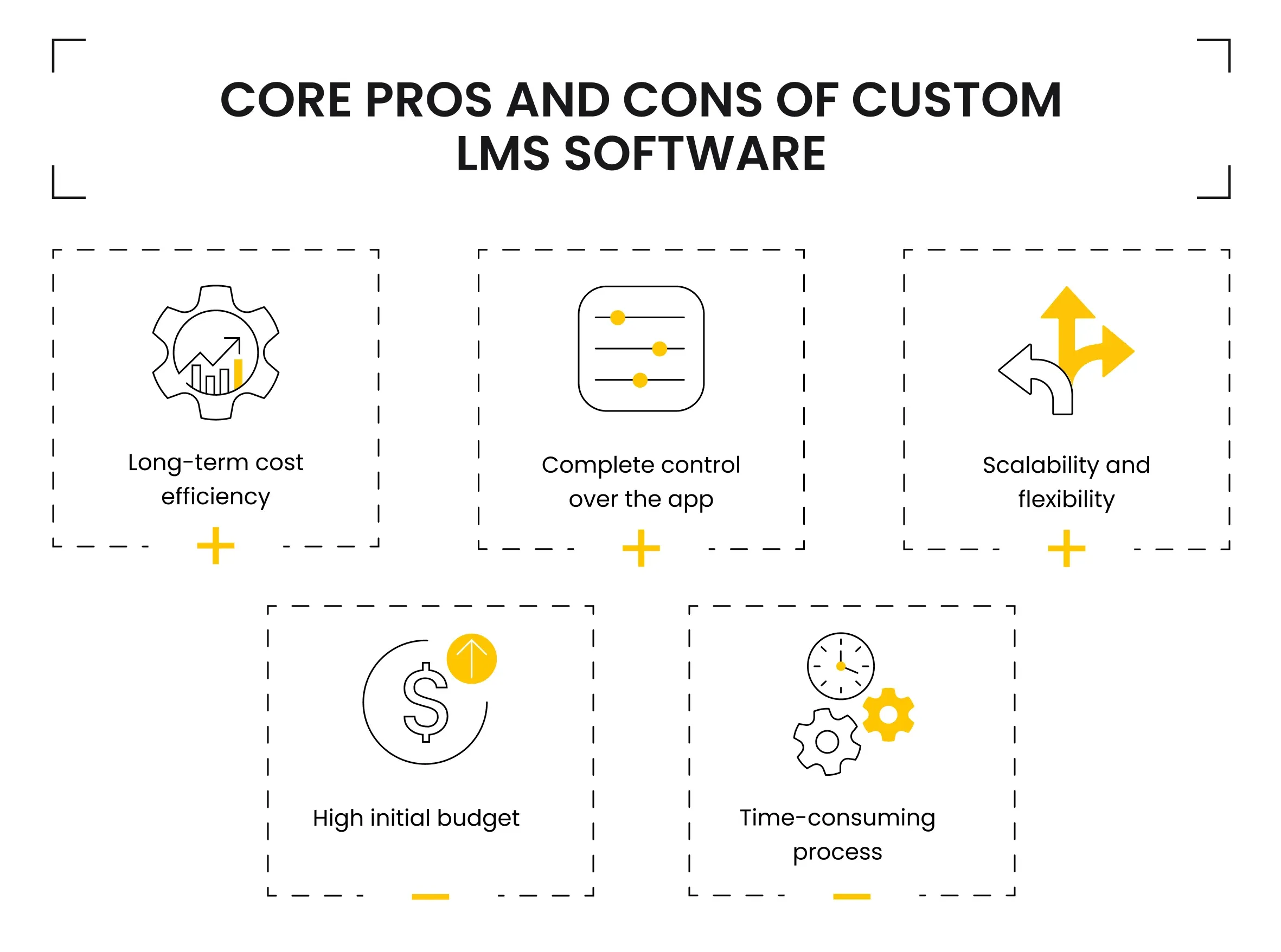
Let’s start with the advantages of such solutions. Frankly, the number of custom learning management system features includes countless advantages.
First, these projects are tailor-suited, i.e., designed according to all your requirements, demands, specifics, etc. Custom software creation is always a highly personalized process that satisfies all your business needs.
The reason is simple: most custom projects are maintained from scratch. So, it includes software planning. This, in turn, requires forecasting potential changes and innovations that can be integrated, drafting future scaling options, and so on.
Finally, projects from scratch have no IT infrastructure or other elements, giving prosperity for idea implementation: existing software has limitations and can’t support certain operations. At the same time, when there is no IT basis - you are free to plan whatever you want as long as you can afford its implementation.
Still, it is possible to highlight two core undeniable advantages of custom software development services at the moment:
- Long-term cost savings
- Scalability based on organizational growth
Long-Term Cost Savings
Custom LMS platform development is much more cost-efficient in the long term than any SaaS alternative.
Once again, the reason is apparent: ready-made solutions should still be developed. Thus, such IT vendors include their expenses on software creation, revenue from services, and other costs.
The only difference is that they divide the final price into much smaller repetitive fees like monthly or annual subscriptions. So, it seems cheaper for the user in the short run. Nevertheless, maintaining custom software development for learning management systems would be more efficient and affordable if you plan a long-term operation.
Scalability and Organizational Growth
Another vital learning management system feature is the software scalability option.
Each successful business scales. The same is true for software solutions. When you cooperate with a custom LMS development company to create your eLearning application or platform, you have complete control over the IT infrastructure and other code-based components.
Thus, you can adjust your software according to new demands or needs, redesign the infrastructure, integrate new features, migrate to the cloud, etc. The variety of options to consider is limitless. Still, each such change requires an experienced development team on board. Besides, you will also have to spend time and resources on software maintenance.
Nonetheless, competitive control over software is a compelling advantage that also highly boosts your rival capabilities and enhances your services, offering countless ways to improve.
Cons of Custom Solutions
Unfortunately, custom learning platform development also has several serious challenges that must be dealt with. The core drawbacks of custom LMS development are:
- High upfront costs
- Time-consuming development
High Upfront Costs
Starting a new project from scratch is always a consuming process. However, one of the biggest concerns is the requirements for high initial investments.
While SaaS can be easily integrated in a few hours and relatively cheap (you can start by paying just for one month), custom product development requires detailed planning and calculations.
Before starting your development, you must have enough money and other resources to deliver the expected result. Moreover, you won’t be able to monetize the custom software while it's under development. Additionally, you will most likely spend extra resources on supplemental tools or ready-made solutions while your software is being created.
Long story short, to maintain a custom LMS software development, you have to plan your budget and ensure you have enough money for a few months or years of no profit, depending on the complexity and scale of your custom project.
Besides, you have to evaluate the learning management system price with your tech partner. Each custom project varies in operational expenses and delivery terms, making it hard to predict the final cost of your project accurately.
Even the most detailed estimation can’t wholly predict all the challenges and expenses on the way. So, you should also have some extra resources, just in case.
Time-Consuming Development
Custom EdTech apps creation is a time-intensive process that takes from a few months to a few years, depending on the planned project's complexity and scale.
Unfortunately, this does not only mean a delay in the possibility of using the full potential of software tools. Apart from that, you won’t be able to monetize and return the investments for some time.
Therefore, if you require an instant solution or don’t have time to spare on development - you might choose alternative development solutions or consider integrating ready-made software. However, to make a balanced and informed decision, we should examine the core pros and cons of ready-made LMS solutions.
Overview of Ready-Made LMS Solutions
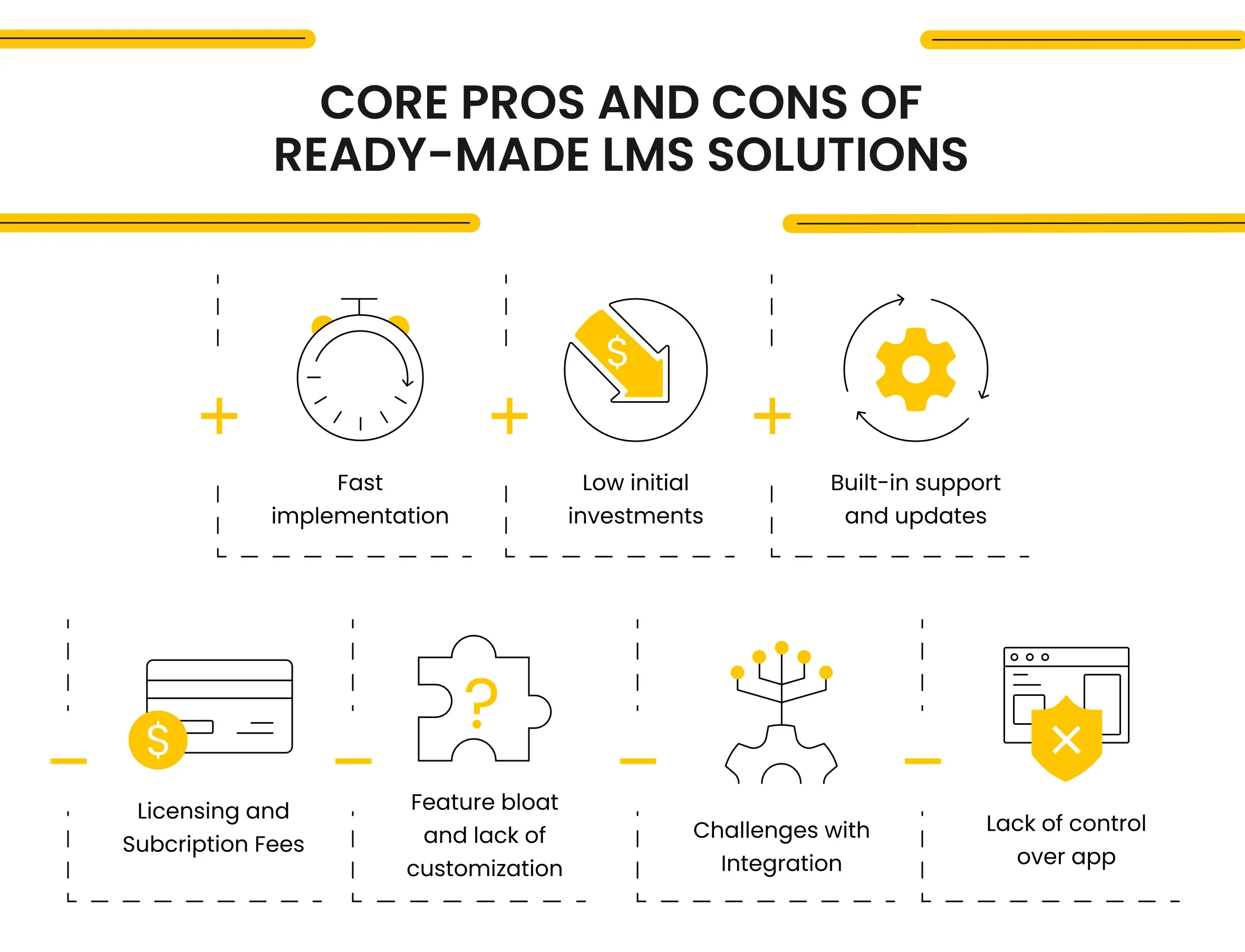
So, what benefits can ready-made LMS software offer to compete with custom learning management system development?
As mentioned, such ready-made software solutions are usually distributed by IT vendors and require very few steps before use. Thus, the first advantage of ready-made LMS is the speed of integration: you can easily do it in just a single day.
Nevertheless, it is by far not the only advantage of such offers.
Pros of Ready-Made LMS Solutions
Ready-made systems suggest many minor and crucial benefits to consider. Yet, the key pros of ready-made LMS include:
- Faster implementation
- Lower initial costs
- Built-in support and updates
Faster Implementation
Once again, choosing ready-made learning management systems allows you to skip the development process and enable required features in just a day.
This also means that you can start profiting from software-based solutions much faster, including the possibility to monetize your services more efficiently and offer new features.
Lower Initial Costs
Unlike custom learning management system development, integrating ready-made systems doesn’t require high initial investments. For instance, you can simply pay a monthly subscription and use the offered services.
So, this would be a much more suited solution for small educational companies with a limited budget. Spending more money on your core services, like planning curriculum or hiring better teachers, is better than spending everything on software platforms with poor content.
Built-In Support and Updates
Finally, in such terms, you will have an IT vendor responsible for your software services. As a result, you don’t have to hire and maintain a software development team, get into the specific software sphere, etc. You are just a customer who doesn’t need to know how the product is produced or works.
Aside from that, you don’t have to worry about software maintenance or updates: everything is done by your software provider. Even if you face any bugs or errors, all you have to do is report them.
As a result, thanks to ready-made software integration, you can prioritize your educational services, work more on learning-related processes, find ways to improve your offer, and create a better product.
Cons of Ready-Made LMS Solutions
Clearly, ready-made learning management systems seem like an undeniable winner compared to building LMS from scratch. However, we also should talk about the cons of such software.
Again, there are many challenges and drawbacks of ready-made LMS solutions. Yet, the most important issues are:
- Licensing and subscription fees
- Potential for feature bloat or lack of specific services
- Challenges with integration into existing systems
Licensing and Subscription Fees
While ready-made software requires a very low initial budget, you will still have to pay.
The fact that the fee is paid monthly or annually is not the main issue. The main problem with such subscriptions is the “progressive fee”. Simply put, most such vendors don’t have a fixed service price. Instead, the subscription fee commonly scales. Primarily, core factors that impact the initial price include:
- The scale and complexity of offered services. In other words, SaaS owners regularly “cut” their platforms into packages based on the features they provide. The more features you get - the more expensive it gets.
- The number of business employees. Increasing the number of authorized users is also a popular way to define the subscription fee. Like with offered feature packages, the more users you want to add to the platform - the more you should pay eventually.
Feature Bloat and Lack of Specific Services
Another side effect of SaaS solutions is the so-called “feature bloat”. This term means products that are overpacked with multiple features.
To rephrase, SaaS owners commonly add some popular solutions like NFTs or blockchain, even if there is no actual need or benefit from them. However, such products can advertise software-driven features and services, most of which make no sense.
At the same time, some niche metrics or innovative features can be excluded from the offer, making businesses find other ways to use and integrate them. This is a widespread drawback of SaaS solutions. The only way to enable required instruments - is to ask software owners directly. Yet, there is no guarantee of your request satisfaction.
Challenges with Integration into Existing Systems
Finally, the foregoing issue also combines with the overall integration capacities. Usually, ready-made solutions offer countless integration options and enable seamless migration from one type of software system to another.
Nevertheless, most of such integration options are enabled via API and generally relate to well-known software like Google Cloud, AWS, Notion, etc. Suppose you are using outdated or custom software solutions in your business. In that case, you will likely face many issues and require a lot of time and resources to ensure an efficient data transaction.
NOTE: not to mention the complexity and scale of work to enable cooperation between LMS SaaS and your custom/outdated infrastructure.
Key Factors to Consider When Choosing Between Custom and Ready-Made LMS
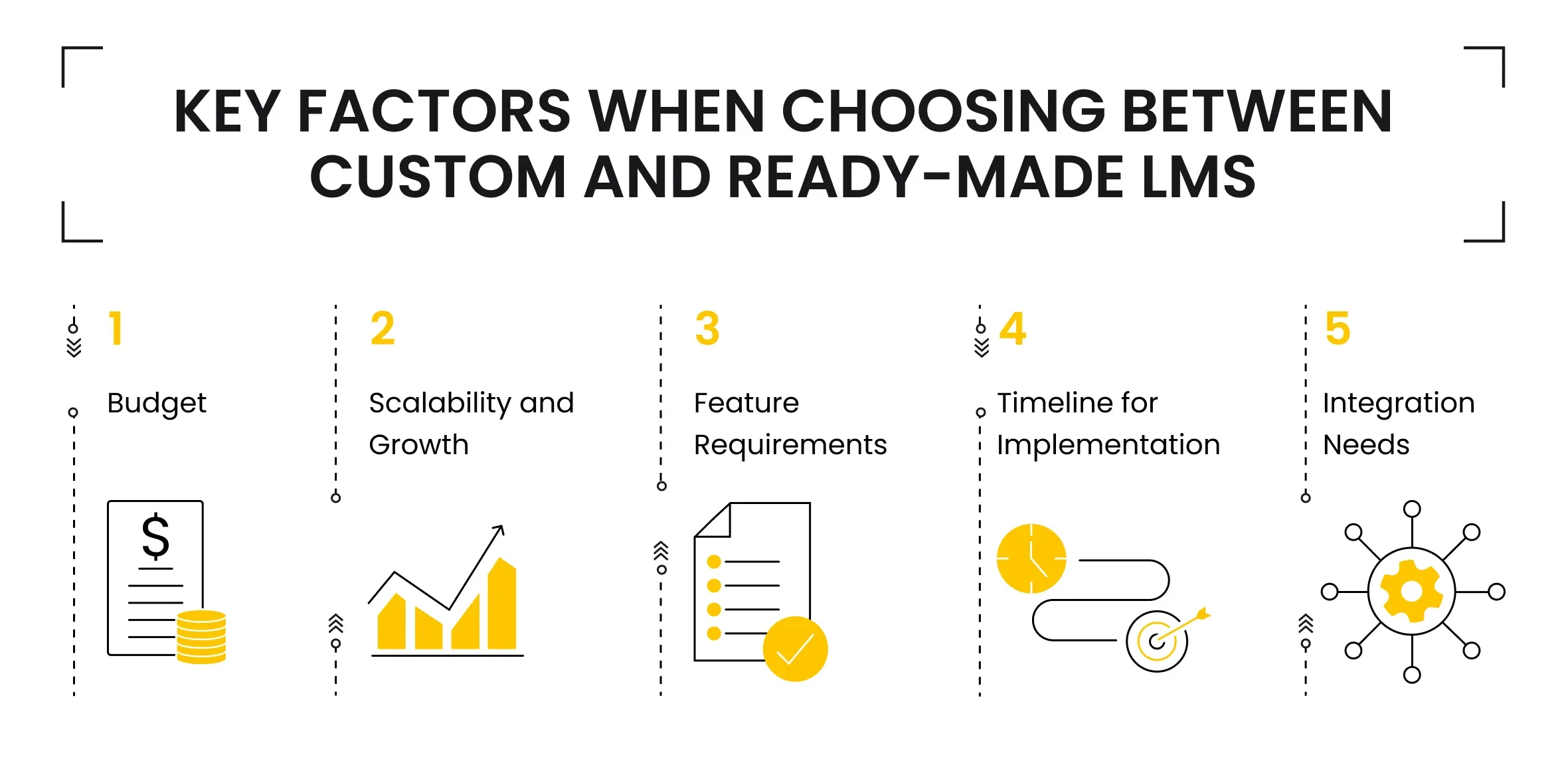
So, what else should you consider when choosing between developing custom LMS and SaaS solutions?
In a nutshell, there are a few vital criteria to estimate and consider:
- Budget
- Scalability and Growth
- Feature Requirements
- Timeline for Implementation
- Integration Needs
Budget
Obviously, your budget plays a dominant role when choosing between two possible solutions. Small businesses will prefer SaaS at the start of their digitalization.
At the same time, startups will prefer custom learning management system development because they are product-oriented businesses and will plan software products as a part of their services.
Middle- and large companies have capabilities and, most likely, business needs that can be satisfied only by custom LMS development.
However, we strongly recommend each educational business try out existing ready-made LMS systems. Therefore, they can pinpoint and notice what functionality they lack or can improve and find practical or must-have features and services they didn’t count before. Besides, each type of mentioned companies has enough resources to cover ready-made learning management system price.
Scalability and Growth
Another important aspect is your plans for scalability and growth.
Clearly, a custom software solution will be a more suitable choice for cases when you have a lot of plans for a long perspective. SaaS solutions can also scale, but this scaling is limited to the number of employees accessing the platform or the variety of available SaaS features.
Nevertheless, scalability and growth are not must-have aspects. For example, if you have a detailed plan for using the software-driven processes and don’t plan or need to scale them in the future - you can limit yourself to using ready-made software as long as it satisfies your needs.
Feature Requirements
Feature requirements include a variety of factors and variations. While the rest of the factors can be easily planned, clarifying feature requirements is a more complex task demanding much more time and effort to explore and finish.
Your feature requirements will vary depending on multiple factors. For instance, an adaptive learning management system will have one set of must-have features, while traditional LMS will share some of them with other functional requirements.
The best way to define the feature set - is to contact a custom LMS development company directly and discuss your ideas. Such niche experts can significantly help you to plan the best setup for your future LMS.
You can choose between ready-made and custom LMS solutions only after you have a list of features. Otherwise, you can make a wrong decision that won’t serve your primary goals.
Timeline for Implementation
Once again, available time for implementation is a crucial factor. While implementing your learning management system, you can’t use or profit from it.
Therefore, if you have a lot of time and can wait - you might choose a custom development solution; otherwise - ready-made SaaS is your only choice.
Integration Needs
Finally, you should plan and list all your integration needs. This includes the time and resources required for LMS implementation and integration, as well as more technical aspects.
Primarily, we mean the need for third-party integrations or other ready-made software to enable certain features. It can be an integration of Google Workspace collaboration tools, the possibility to connect your older LMS solutions or any other software system.
Cost Comparison: Custom LMS vs. Ready-Made LMS
Now, let’s talk about the learning management system price.
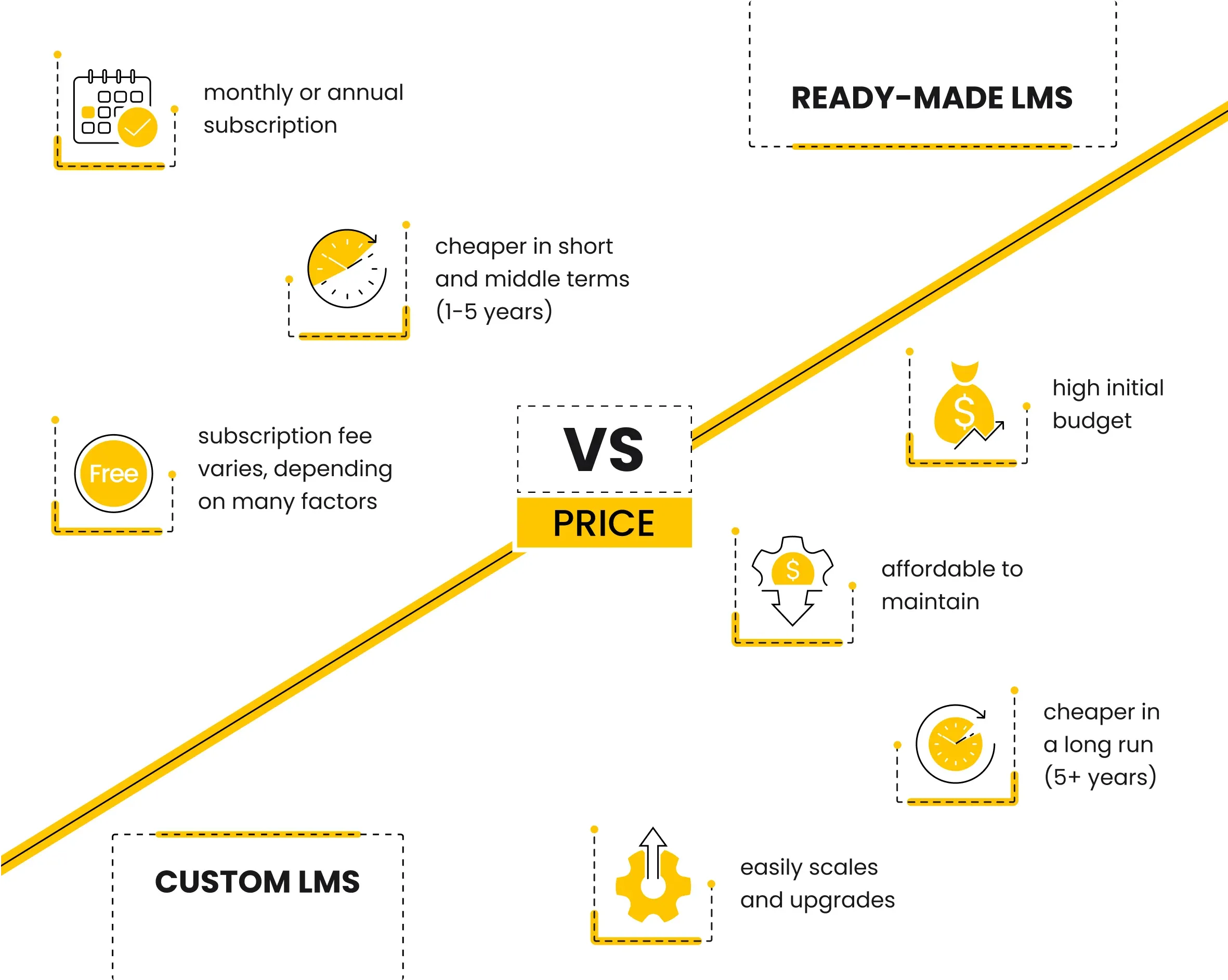
We all understand that regardless of your intentions and ideas, you should prioritize available resources and potential outcomes as a business owner. Otherwise, your business might fall apart and stop providing its services on the market.
When comparing the cost of custom LMS and ready-made solutions, we should consider them in two scenarios: short-term usage and long-run perspective.
Short-Term Use Cases
Unmistakably, you should choose SaaS when you need to cover some processes and services for a short period. Therefore, you can integrate the required software immediately, wasting no time and resources on its planning, development, debugging, etc. With relatively low initial investment requirements, ready-made solutions help businesses significantly reduce expenses.
Frankly, there is no need for custom learning management system development if you plan a short-term project or service that relies on software: the initial investment will be way too high. Besides, it will also take some time to design and develop a custom system.
Long-Run Perspective
However, if you are looking for a reliable and convenient management instrument that will work for a long time, custom LMS development is your perfect choice. In such a scenario, you will have to spend much money and effort to finish your software project. Also, don’t forget that you must spend resources on software support and maintenance.
Yet, the subscription fee for ready-made LMS solutions sums through time, becoming less beneficial than custom projects in 5-10 years.
Moreover, don’t forget about all other features like the possibility of scaling functionality, integrating new solutions, etc. In other words, custom learning management system development is better for scenarios when looking for a full-fledged, life-long software solution.
So, are there other reasons or conditions for choosing ready-made or custom LMS development? To simplify, let’s consider the final list of conditions, when you should prioritize each solution over another.
When to Choose a Custom LMS Development
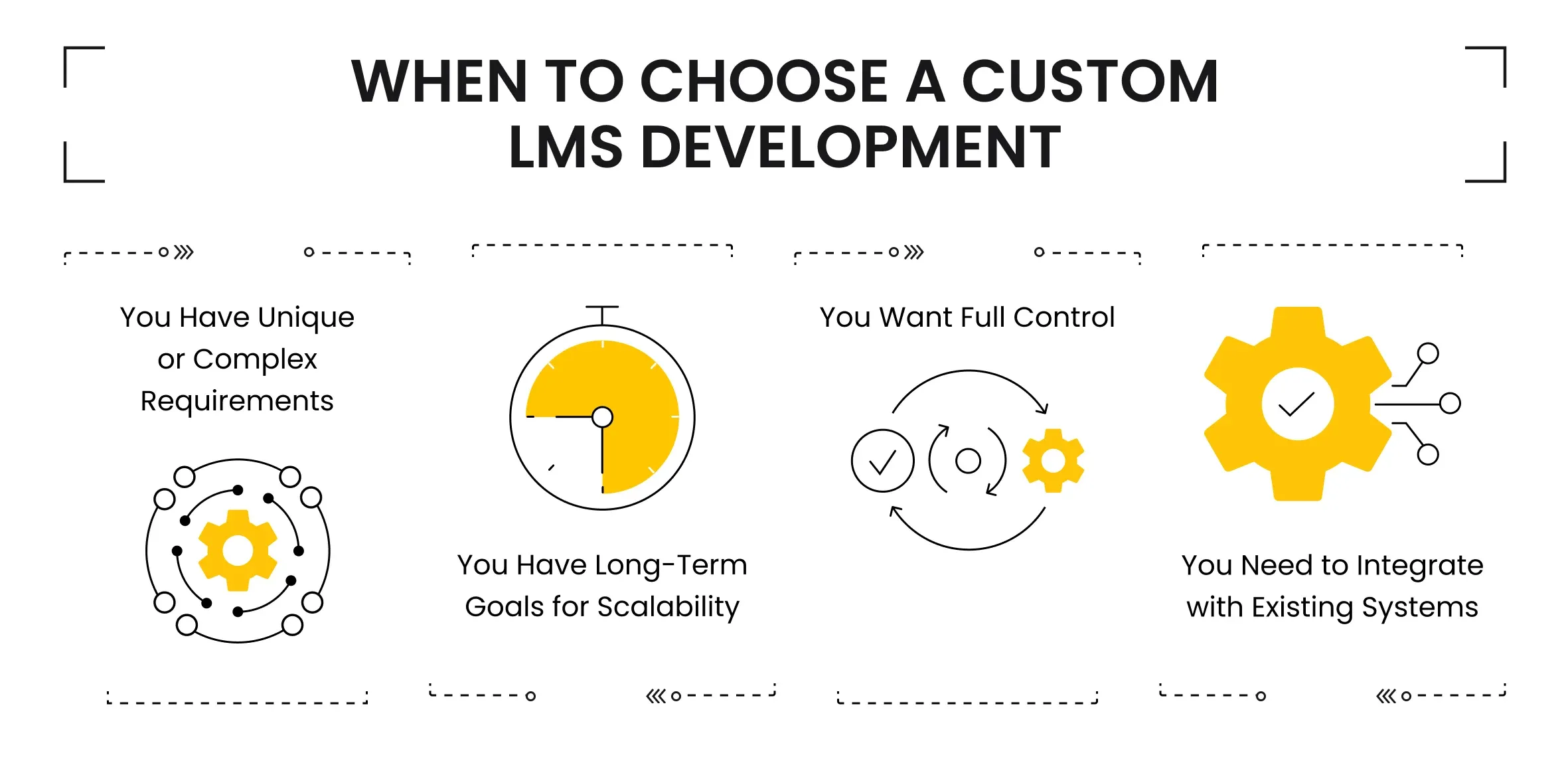
In a nutshell, custom learning management system development is the best choice for cases when:
- You Have Unique or Complex Requirements
- You Have Long-Term Goals for Scalability
- You Want Full Control
- You Need to Integrate with Existing Systems
Custom software development is a tailored service that prioritizes the client's needs, so if you have any requests that are not offered or satisfied by existing products - a custom LMS solution.
Apart from that, such projects are much better from a long-term perspective. Besides, they can be modified and changed because you have complete control over IT infrastructure.
When to Choose Ready-Made LMS Solutions
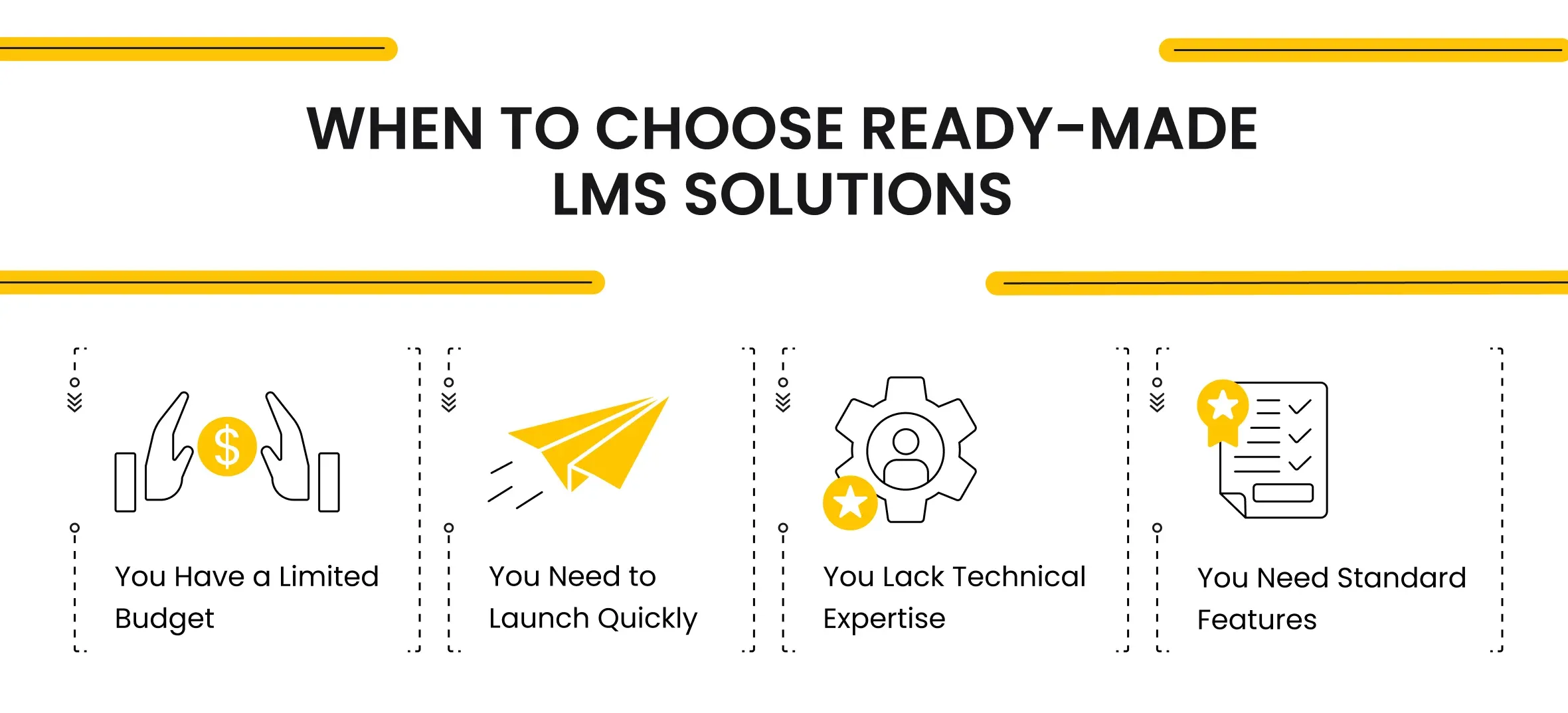
The reasons to choose ready-made SaaS solutions for learning management systems are:
- You Have a Limited Budget
- You Need to Launch Quickly
- You Lack Technical Expertise
- You Need Standard Features
In other words, if your needs are not as sophisticated or complex and are covered by most ready-made LMS software - there is no need to spend extra time and resources on custom projects.
Besides, the lack of technical expertise, strict deadlines, or limited budget also play a crucial role in choosing ready-made LMS.
Examples of Successful Custom LMS Implementations
For more details and real-life examples of successful custom LMS implementation, we recommend you visit our case studies section, where you can find our latest software projects in the EdTech field.
Also, you can always contact us for more details or to discuss your ideas. We will gladly examine your needs and suggest the best solution that satisfies all your needs, whether SaaS or custom learning management system development.
What’s your impression after reading this?
Love it!
1
Valuable
1
Exciting
1
Unsatisfied
1
FAQ
Let us address your doubts and clarify key points from the article for better understanding.
How long does it take to develop a custom LMS?
Developing a custom Learning Management System (LMS) typically takes 3 to 12 months, depending on complexity, features, and team size. A basic LMS can be built in 3-6 months, while a fully customized solution with advanced features may take 6-12 months or more.
Are ready-made LMS solutions suitable for large organizations?
Yes, ready-made LMS solutions can be suitable for large organizations, but they may have limitations in customization, scalability, and integration. Enterprises often prefer custom or highly configurable LMS platforms to meet specific needs.
Which is more cost-effective: a custom LMS or a ready-made LMS?
A ready-made LMS is generally more cost-effective upfront due to lower initial costs and faster deployment. However, a custom LMS can be more cost-effective in the long run if extensive customization, scalability, and unique features are required, reducing dependency on third-party licenses and fees.
Which LMS option is better for small businesses?
A ready-made LMS is usually the better option for small businesses due to its lower cost, faster deployment, and ease of use. It provides essential features without the high development expenses of a custom LMS.
YOU MAY ALSO LIKE
Let’s talk!
This site uses cookies to improve your user experience. Read our Privacy Policy
Accept

Share this article